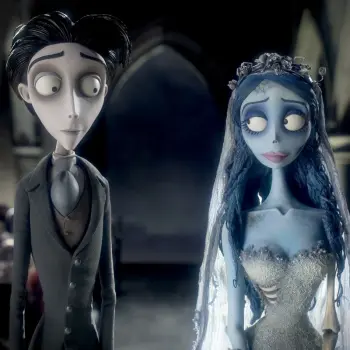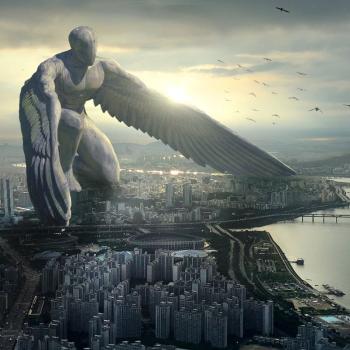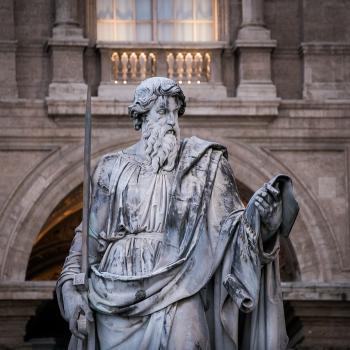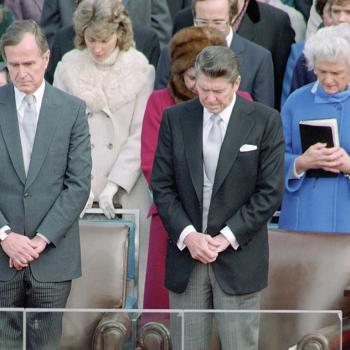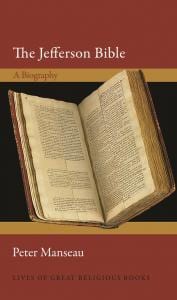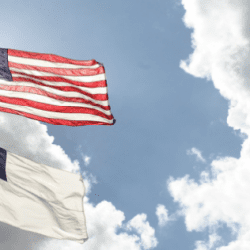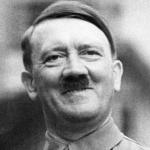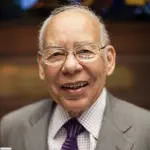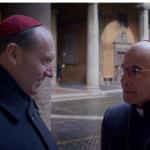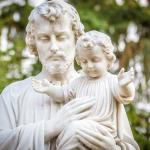Today’s guest post is an interview with Dr. Andrew O’Shaughnessy, by David Moore. Dave blogs at www.twocities.org.
Dr. Andrew O’Shaughnessy is vice president of the Thomas Jefferson Foundation at Monticello. His book, The Men Who Lost America (Yale, 2013) has received number of awards, and is a finalist for the George Washington Book Prize.
Moore: It seems incredible that the British lost the Revolutionary War given their military superiority. Many have concluded that it must have been due to incompetent leaders, but you want to challenge that popular notion, correct?
O’Shaughnessy: This is correct. The idea that it was lost by incompetent leaders is most apparent in movies and the popular media which have much greater influence on public opinion than books. It even permeates popular history and college textbooks. It should be said that such images were if anything more common in Britain. It is a curious thesis because it diminishes the achievements of patriot leaders in winning the war. The Men Who Lost America portrays the ten key political and military decision makers as figures of substance who represented some of the best and the brightest in Britain. The line between success and failure is often thin since some of the same individuals later became heroes and national celebrities.
Moore: I Cor. 14:8 says “if the bugle presents an indistinct noise, who will prepare himself for battle?” Did the variety of British perspectives on the war hurt them being victorious?
O’Shaughnessy: British perspectives did adversely affect their chances of success in America. They initially believed that resistance would be largely confined to Massachusetts. They greatly underestimate the ability of ordinary citizens to be able to confront a professional army. However, their greatest error was in assuming that the majority of Americans supported Britain. Their views while mistaken were defensible since were encouraged in their beliefs by loyalist Americans. This was indeed a civil war and a foreign war in which it was difficult to interpret popular opinion when the situation was fluid and when many did not openly express their sympathies. The contempt for citizen soldiers was held most strongly by officers who had served in America during the French and Indian War. It may have been partly a product of imperial and social superiority but it was also a more modern vice of professional elitism and the belief that regular citizens could not be trained to the standards of those who had made the army a lifelong career.
Moore: Your chapter on George III rehabilitates him in a big way. There is much to like about King George III. Among other things there is his character and intellectual curiosity. Do you think his legacy among Americans will change as more is learned about him?
O’Shaughnessy: The reader will indeed find many attractive qualities in George III. He was the first British monarch to have a real interest in science. He was the greatest collector of art since Charles I. He knew more about the navy than any king since James II. He was an intensely religious man who spent long hours with his family in devotion. He disapproved of the sexual immorality which so common among his contemporaries and he was faithful to his wife unlike George I and George II.
George III has long been the subject of revisionist historians in Britain. It has almost gone too far. My portrayal is more nuanced. George III was not a tyrant who was responsible for the policies that led to the American Revolution. He had little to do with colonial policy. However, after the Boston Tea Party, he became the leading war hawk and may actually have helped to perpetuate the war by several years. He wanted to continue after Yorktown. It was revelation to me that he felt so passionately that Britain would cease to be a great power if it lost America.
Moore: What were the views among Parliament with respect to the Boston Tea Party?
O’Shaughnessy: The Boston Tea Party helped to unify all parties in favor of punishing Massachusetts. It was regarded as violation of private property and an overt act of civil disobedience. It should be remembered that many future patriots disowned the radical behavior of Boston. Benjamin Franklin even offered to compensate Britain.
Moore: In speaking about the French Revolution, Lord North predicted the “anarchy and bloodshed which will soon overwhelm that unhappy country.” What gave him the ability to make such a prediction?
O’Shaughnessy: Lord North was not alone in predicting the blood baths of the French Revolution. It was Edmund Burke who most famously predicted that it would end in dictatorship in his Reflections on the Revolution in France. Burke is often seen as a father of modern conservatism because of his belief that society should change organically rather than radical change which would destroy the fabric of the state. North was fluent in French and had spent time in France. He was an admirer of Burke although the two had been opposed on the subject of the French Revolution. He was also a product of his class and society who feared the egalitarian and leveling tendencies of the French Revolution. It should be remembered that even the patriots rarely used the word democracy but rather spoke of republicanism. The former was associated with anarchy.
Moore: What did the average Brit think about enlisting German soldiers in their cause?
O’Shaughnessy: The use of German troops was not popular in Britain. There was indeed a long-standing distrust of the professional army and of the danger of tyranny by the government. It was very apparent that the generals also disliked having foreign troops and much preferred their own. It was common to blame them for the rampant plunder of civilians committed by the army. It did not help that German troops seemingly failed at the critical battles of Trenton and Bennington.
Moore: Among others, General Burgoyne admitted that the Continental Army was more impressive than he originally thought. What changed his opinion?
O’Shaughnessy: Burgoyne expected that he would meet little resistance after he captured Fort Ticonderoga. He later complained that his opponents were like the classical mythological figure of the many-headed hydra which would grow more heads every time one was decapitated. He originally had double the number of enemy troops but he was outnumbered four to one at Saratoga. He also had the opportunity to see for himself the effectiveness of the Continental Army. Indeed, he soon came to the conclusion that the war was unwinnable. His praise of the patriots was shared by many of those officers who had been most contemptuous before the war of the fighting capacity of Americans.
Moore: Cornwallis was willing to pay for various war expenses out of his own pocket. Not only does this showcase his generosity, but does it not also demonstrate how convinced he was that the British were on the right(eous) side of the war?
O’Shaughnessy: Cornwallis had actually opposed the policies which led to the war in America. He was one of only six members of the House of Lords to vote against the Stamp Act. However, he was very much the professional military man who believed he should obey orders regardless of his personal feelings. He was also concerned for the welfare of his troops. There was much less distinction between private money and public money in the eighteenth century. It was common for individuals to combine accounts. The army was inadequately funded and relied on private sources which helps explain the selling of commissions.
Moore: You rightly mention the stellar character of George Washington. No one is perfect of course, so I am curious what you think about him not helping Paine out later on when Paine had helped Washington so much?
O’Shaughnessy: The change of attitude towards Paine was largely because of his atheism and his book The Age of Reason. Paine was a permanent revolutionary who supported the opposition to Washington in the 1790s. He was much more radical than the general and famously derided the president in an article which made the breach permanent. Nevertheless, he is deserving of recognition today for his service in the army and most critically his role as a patriot propagandist.
Washington fell out with those revolutionary leaders who joined the Republican opposition to his government in the 1790s. It was a bitterly partisan decade not least because each party believed that it alone represented the true spirit of the American Revolution. They thought that their opponents would destroy America. It is a lesson for us today because the country has been enriched by both these traditions even though they were often in conflict.
Moore: What surprised you most in researching this book?
O’Shaughnessy: I suppose my greatest surprise is the extent to which this side of the story is so unknown and yet is necessary to make the war fully intelligible. The leaders portrayed in my book are often the subject of one scholarly biography like Lord George Germain who was chief architect of the war in Britain. This perspective has enabled me to offer a very different explanation of why the British lost America. The problem of the almost comical popular image of these men is that it deflects from understanding the real essence of this war and makes it seemingly less interesting than say the Civil War. The British conquered every major city at some stage of the war which was intensely fought until the very end. It was never a war of linear defeats for the British who looked as if they might have regained the advantage in 1780. There was a real danger that the revolution might have imploded through lack of resources and bankruptcy. The book provides good reason to celebrate enthusiastically next Fourth of July.



